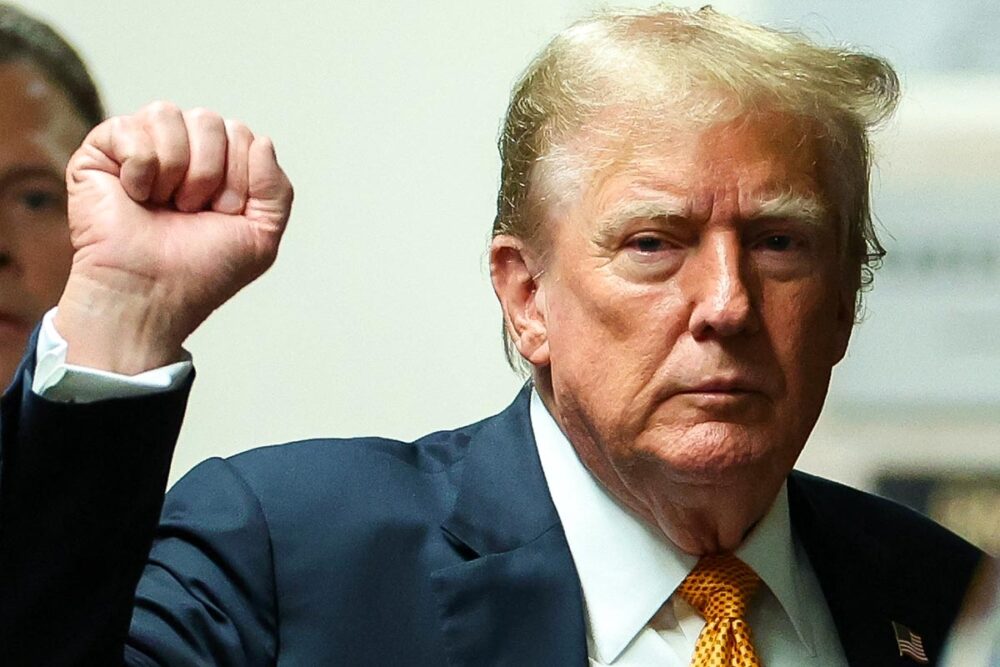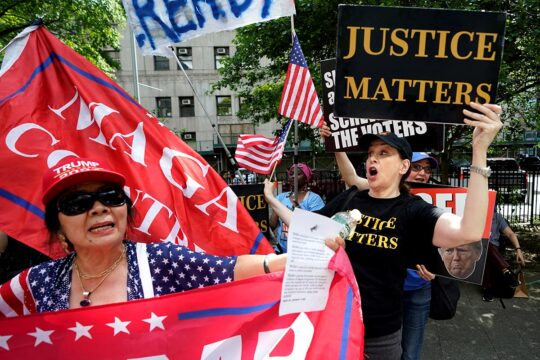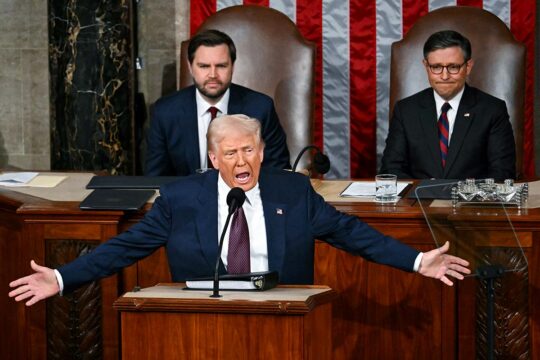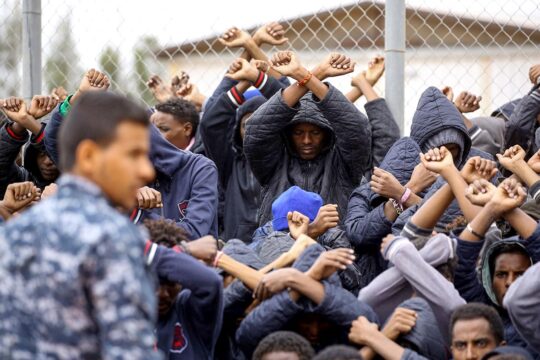Todd Buchwald, the U.S. ambassador-at-large for global criminal justice from 2015 to 2017, describes the new potential sanctions for the International Criminal Court (ICC) as “draconian” and compares them to those “the U.S. government uses against persons who pose grave national security threats, like al Qaeda members and other terrorists”: “They are designed to cut off any possible avenue for such persons to receive funds or other support.”
The court’s president Tomoko Akane in her statement to the ICC’s annual meeting last December used the same terms: “The Court is being threatened with draconian economic sanctions (…) as if it was a terrorist organisation,” she said. “These measures would rapidly undermine the Court’s operations in all situations and cases and jeopardise its very existence”.
The Congressional sanctions on the ICC are now with the U.S. Senate, but as President Donald Trump is inaugurated, his new administration may implement sanctions whether mandated by lawmakers or not. This call for sanctions happens as for the first time, the Court has issued arrest warrants against a U.S. ally, the leadership of Israel. Exactly what form these sanctions will take, whether they will encompass the whole institution or just individuals, is still unknown and will be up to President Trump.
The 2002 Hague Invasion Act
The U.S. has a long history of rejecting the Court’s jurisdiction, especially whenever the Republicans have been in power. Back in 2002 just as the court came into being, the U.S. Congress passed the American Service Members Protection Act (ASPA), known as The Hague Invasion Act, to protect its servicemen and women from investigation.
But those restrictions “turned out to be largely navigable, at least as a legal matter,” notes Buchwald. “The international community has come to live with the ASPA, and it has not precluded the United States from being supportive of most of the Court’s activities. Indeed, Court officials have appreciated that support.”
For Buchwald, the current approach is of a different order: “It’s true that the ASPA contained a provision authorising the use of force which received a lot of attention. But in the real world, it served basically as a political expression of disapproval and there was never a serious issue about using that authority to invade the Hague.” “This is different. This is not meant to be lived with. This is meant to destroy the Court unless it changes course,” he says. This legislation “is really a frontal assault to try to squeeze the life out of the court unless it changes course, whereas the ASPA was more aimed at restricting the ability of the U.S. government to provide support to it.”
Harold Koh, who was the legal advisor at the State Department under Obama and held a senior position in the Clinton administration, recalls that when the Bush administration pushed for enactment of the ASPA in 2002, then-Senator Chris Dodd “had inserted in it the Osama bin Laden exception, which allowed the U.S. to support pursuing someone like Osama bin Laden”. It was that “exception”, says Koh, that was used to support the ICC at the beginning of the Biden administration.
Yo-yo relationship
The analogies used to describe the U.S. relationship with the ICC all recognise how up and down it has been, especially according to which party has run the administration. “I think it’s fair to say that the Biden administration has been the most supportive of the ICC of any of the U.S. administrations. And so that’s a high watermark. And we’re now going back down to a low watermark,” Koh says.
For Kip Hale, the founding director of the American Bar Association’s ICC Project that focused on U.S.-ICC relations through public and private means, the relationship is “more as a pendulum swinging,” “two steps forward, two steps back,” and that Is also due to a lack of knowledge about the ICC. “I can’t tell you how many meetings I’ve had on Capitol Hill where both Republican and Democrat staffers are just operating on the premise that there’s some sort of bipartisan consensus that ‘the ICC is bad’. And they don’t even know why. If you would ask them, they have no idea. They just take it as gospel.”
“I think it’s more of a yo-yo,” says Milena Sterio, professor of Law at Cleveland State University. “When you look at the U.S. relationship with the Court starting back in 1998, things have gone back and forth with different presidential administrations, with basically the Democrat administrations being a lot more supportive of the Court,” she says, adding : “We’ve seen that under the Biden administration, which was willing to support the court on the Ukraine investigation, for example. The Obama administration similarly was supportive of the court in limited ways. And then, we’ve seen, for example, the Bush administration very hostile to the court, negotiating these bilateral agreements with other countries left and right to make sure that they wouldn’t extradite anybody to the court. And then the peak of the hostility obviously is with the Trump administration.”
For Adam Keith, senior director for accountability at Human Rights First, an NGO, and former senior policy advisor at the State Department, “this also just highlights more than ever the importance of the court not becoming dependent on or limited to U.S. support because of how unreliable, and in the best case off and on fickle it is. This is obviously more than just turning off support. It’s going to go into a sort of economic war with the court, which is what’s so horrifying about it.”
The reasons of the Trump administration’s ire
It was in 2020, under a previous ICC prosecutor that the Court attracted the ire of Donald Trump’s administration. Fatou Bensouda had not yet officially opened the investigation into Palestine, but had asked the Court to go ahead with an investigation into Afghanistan, including alleged crimes by U.S. forces, such as “acts of torture, cruel treatment, outrages upon personal dignity, rape and sexual violence” committed in that country 2003 and 2004, and later in CIA black sites in Poland, Romania and Lithuania. The sanctions themselves – as opposed to other more diplomatic measures to protest against the Court’s actions – came as a surprise to most observers. “Because it hadn’t been done before, we were all taken aback and all surprised,” says Sterio, “because imposing sanctions against an international institution or against an international institution’s high-level official is so unprecedented.”
In an interview, Bensouda said it was clear that “to a very large extent, it was these two cases, Afghanistan and Palestine, that probably led to the sanctions,” although she argues that she was able to justify that she “was not overreaching,” but “acting within the legal framework”. She says she “had the evidence to move forward with this” but “it landed me in trouble”.
“John Bolton [Trump’s former national security adviser] certainly had made threats against the Court and called it an illegitimate institution,” Sterio recalls, “but I personally did not expect that sanctions would be imposed because up until that point, sanctions had been used against individuals like El Chapo, narco-terrorists or traffickers, and against individuals associated with Al Qaeda.”
Sanctioning ICC officials from small African countries
In 2020, two individuals, both from small African states, were singled out for the sanctions. The Court’s prosecutor Bensouda is Gambian and Phakiso Mochochoko, a long-serving Court official and head of the jurisdiction, complementarity and cooperation division of the Office of the prosecutor, is from Lesotho.
Looking back, Keith notes the singling out of people from ‘weaker’ states. For example, the then Canadian deputy prosecutor to Bensouda “who was presumably in the chain of command in the ‘offending’ investigation, didn’t end up on the sanctions list”. That gap indicates the lobbying behind the scenes from U.S. allies to protect their citizens. In 2020 the “close allies’ filter,” as Keith calls it, “was seemingly in effect, where the people who ended up coming out on the sanctions list were the ones from countries whose governments probably didn’t have much clout or ability to push back on the U.S.”. And in the end, “you end up only with a couple of black African ICC officials. And that’s appalling in its own specific way,” says Keith.
The effects on the individuals sanctioned in 2020 were severe. A source close to Bensouda who prefers to stay anonymous described how the then-ICC prosecutor could not withdraw money from a cash machine. “We know from 2020, when the ICC prosecutor and one of her deputies were on the sanctions list, that it was a challenge for them to keep their business services and vendors continuing to engage with them,” says Keith. He says that the details of how they managed to keep going during the 8-months of sanctions are not publicly known: “A lot of the responsibility falls on the Dutch government as the host country of the court.”
Bensouda said that she had repeatedly told the Assembly of States Parties, different states, and NGOs, that “a red line has been crossed and it should not be allowed to stay this way because it’s the prosecutor, it is the Office of the prosecutor that has been sanctioned. And this is totally wrong”.
The sanctions challenged in U.S. courts
Sterio is one of a small group who challenged the order in 2020 through a federal court. “All of us generally believed that imposing sanctions against the ICC is not just ridiculous, but threatens this entire world of international criminal justice, because it inhibits the Court’s ability to function freely,” she says. “It improperly tries to influence the Court into dropping certain investigations. And instead of the United States positioning itself as a leader in international criminal justice, it actually puts the U.S. at the opposite end of the spectrum, where we’re really doing everything to inhibit the court.”
She explains she had “dual motives: a selfish one, and then a more altruistic one”. The way that the sanctions’ regime was structured that time, was that dual nationals – even though U.S. citizens – could potentially be the target of sanctions. “There are so many different ways in which academics like me who focus on international criminal law would be exposed. So the selfish reason was that I knew I was exposing myself to sanctions.” But she was also challenging the principle. Together with other dual national academics and the Open Society Justice Initiative, an American NGO, she challenged the president’s Executive Order as “unconstitutional based on First Amendment grounds because it inhibited our ability to engage in free speech”. She says that approach was also a strategical calculation: “The First Amendment argument was the best one to bring in U.S. federal courts because our judges are very sensitive to those types of constitutional arguments. They don’t necessarily care as much about the ICC, but they do care about free speech.”
Such challenges, says Keith, are “sometimes only workable at the margins” of a policy decision. “They weren’t able to challenge the foundation of the sanctions programmes or to say, 'hey, you can’t put Fatou Bensouda on the sanctions list’,” he says, because “there is a lot of deference to the executive branch by the courts when national security statutes are involved” and the authority of the president is “extremely broad, flexible, and expansive”.
Nevertheless, Sterio believes they achieved an important victory of principle when they got a preliminary injunction against the sanctions. “The standard for granting the preliminary injunction here in the United States is that you have to show a likelihood of victory on the merits and you have to show a risk of irreparable harm. So that was already a large preliminary victory, because the judge agreed with us that we were likely to win on the merits and that we were exposing ourselves to this risk of irreparable harm.”
Biden lifts the sanctions
But the case was overtaken by political events. President Biden was elected in November 2020, and was inaugurated in January 2021. Koh recalls how the Biden administration started with the Trump executive order “hanging over its head” and “how hard they worked to lift it”. “I was in the administration at the time. We all worked on it and it wasn’t as easy a job to get it lifted as you might have thought. There were different people, particularly from the Defence Department who were pushing to keep it in place as a way of warning the court against pursuing American soldiers in Afghanistan. But they ended up not doing that. And so that objection evaporated.”
“We were hoping that the sanctions would be overturned on day one of Biden in office,” recalls Sterio. However, they remained in place and it wasn’t until April that they were overturned. But she believes the legal challenge played a role: “The government’s substantive deadline to provide an answer on the merits to our complaint was due on a Monday and the sanctions regime was overturned on Friday. And I do not believe that that was a coincidence. I don’t think that they wanted to be on record defending the sanctions.”
The second part of this article, which details the potential consequences of these sanctions and their conditions of application, is available here.








